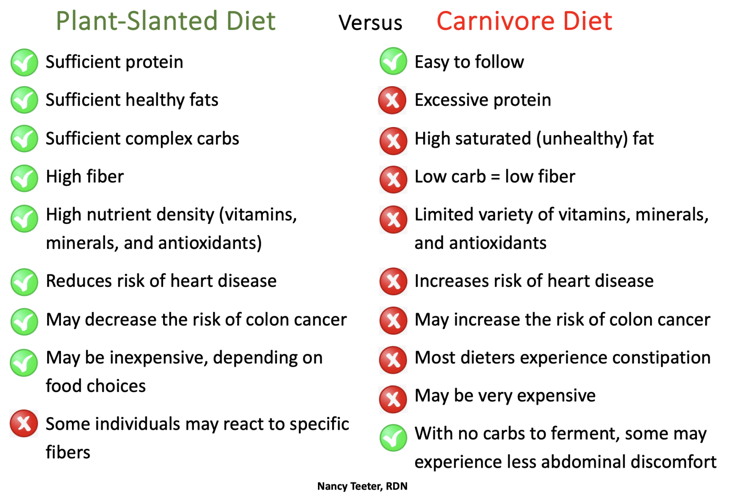Diet whiplash occurs when we switch from one extreme way of eating to another in search of the “perfect” diet. Two opposites on the journey are the diet comprised exclusively of whole foods (WFPB) and the carnivore diet. After defining the two desperate eating patterns, I will review what science tells us about their impact on health and what alternatives you can consider.
Whole Foods Plant-based (WFPB) Diet: People often think this diet is synonymous with veganism. The two diets have the avoidance of animal protein in common, but vegans don’t always eat whole plant foods. WFPB focuses on optimal nutrition through a variety of minimally processed plant foods.
Carnivore Diet: Promotes an all-meat and eggs diet that excludes all plant foods. The diet stresses the importance of leaning heavily on red meat, particularly on fatty cuts that will help meet daily calorie needs. Besides red meat, the diet allows organ meats, poultry, fish, eggs, lard, bone marrow, butter, salt and pepper, water and bone broth.
Evidence for WFPBPopulation and randomized experimental diet interventions show the WFPB diet significantly improves health markers versus the Standard American Diet (SAD). David L. Katz, MD, a specialist in Internal Medicine, Preventive Medicine/Public Health, and Lifestyle Medicine with expertise in nutrition, writes, “The evidence is strong, consistent, and compelling that a diet of predominantly, or even exclusively, whole plant foods can promote health, selectively treat and reverse disease, and confer comparable benefit to the planet.” I recommend “The Plant-Powered Diet: The Lifelong Eating Plan for Achieving Optimal Health, Beginning Today” by Sharon Palmer RDN.
Evidence for CarnivoreThough no peer-reviewed evidence exists, many anecdotal “studies” report people feeling better when they avoid eating plants. Perhaps people confuse gas created by fiber with “dis-ease,” without fiber for the gut bacteria to eat, less gas is produced. Our gut bacteria thrive on fiber and help reduce disease risks.
Besides being low in nutrition, the diet provides more protein than the body can process, which is terrible news for the proponents of this diet. Since the body cannot store protein, the excess is cycled through the liver to become fat eventually. Results from randomized experimental diet interventions show that high protein intake is associated with an increased prevalence and risk of developing pre-diabetes and type two diabetes. In addition, “carnivores” increase their risk of gout, urinary tract infections, cancer, kidney damage and heart disease.
A closely related eating pattern is the Paleo Diet, where followers eat large portions of meat (including bacon and pepperoni) and copious amounts of vegetables. Because they give up excess free sugar, the Paleo diet is marginally better than the carnivore diet, but still provides insufficient fiber and nutrients from legumes and grains.
Let me be clear. I am in no way “anti” meat. I acknowledge my taste for it. All humans share that taste, whether they indulge it or not. Humans are physiologically omnivorous. After allowing that, I encourage people to consume less meat because of the vast research supporting this advice, and eight billion Homo Sapiens cannot have a meat-centric diet without ravaging the Earth. If you are happy following a WFPB, please continue. Other less exclusive plans are options:
Eat primarily whole plant foods, but include fish, seafood and shellfish.
Eat primarily whole plant foods but include eggs and dairy.
Be flexible.
The Flexitarian Diet emphasizes fruits, veggies, whole grains, beans, nuts, legumes, olive oil, flavorful herbs and spices, fish/seafood at least a couple of times a week, and poultry, eggs, cheese and yogurt in moderation, while saving sweets and red meat for special occasions. This is the diet of the people of the Blue Zones. Readers might enjoy learning more from the Blue Zones Kitchen, which fuses scientific reporting, National Geographic photography, and 100 recipes.
Nutrition science is constantly evolving. In the future, dietitians will have the tools to provide personalized nutrition. In the meantime, I encourage my readers to stop the search for the perfect diet. Instead, adopt Michael Pollan’s philosophy, “Eat real, not too much, mostly plants.”
Nancy Teeter is a Registered Dietitian and a SaddleBrooke resident. Though mostly retired, she is passionate about sharing her nutrition knowledge with others. Always consult your medical provider before making significant lifestyle changes.




